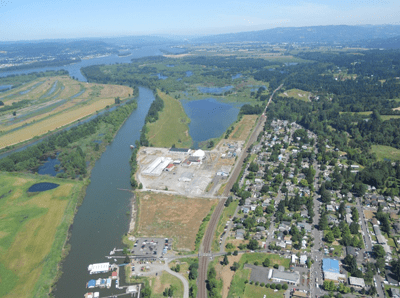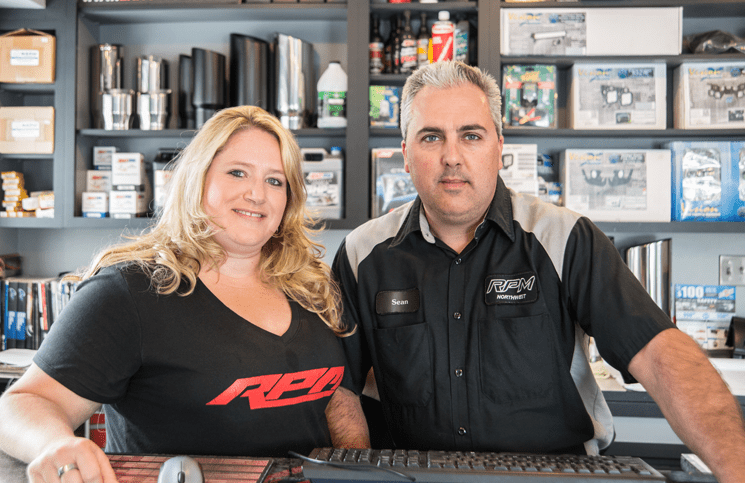When the Port of Ridgefield took on a now familiar waterfront clean-up effort nearly 20 years ago, it was hard to project (even by long-time Port CEO, Brent Grening) just how extensive the efforts would be. Now in the final stages, Grening said that price tag is coming in around $90 million dollars.
Nelson Holmberg, vice president of innovation said, “I would guess, based on numbers alone, it’s one of the biggest, most expensive clean-ups in the history of the state that’s not a superfund.”
Indeed, the contamination left by bankrupt Pacific Wood Treating included 43 acres of waterfront property as well as Carty Lake and Lake River. That acreage, which represents the port’s largest piece of property, is being treated with great reverence by its employees as they move forward in the re-development process.
“We will take great care in looking at what is developed down here,” said Grening. “We have a very rare chance. We have a 40-acre blank canvas, a beautiful waterfront next to a charming downtown and those two things go together and we’re very mindful of that. We want this to be a high quality place that people want to come and spend time over and over again.”
Regardless of lease agreements, the port will retain public ownership of the waterfront so that it remains accessible to residents and visitors alike – solidifying its commitment as a community port rather than a traditional shipping port that handles cargo.
 According to Grening, the Port of Ridgefield is focused on infrastructure and land development for the purpose of job creation. However, that doesn’t mean transportation issues go unaddressed.
According to Grening, the Port of Ridgefield is focused on infrastructure and land development for the purpose of job creation. However, that doesn’t mean transportation issues go unaddressed.
For instance, the Pioneer Street Rail Overpass project is a three-phase endeavor that the port has passionately lobbied to wholly fund. Money was allocated to complete the final phase of the venture in the 2015 Washington State transportation budget and a fully constructed overpass is expected in late 2017. The new overpass will replace two current at-grade waterfront entry points that pose great risk of personal injury, access challenges for emergency vehicles and greater interruption for trains moving freight, among other things.
With the overpass project moving forward, the port is actively marketing the waterfront and talking to interested parties about mixed-use options such as retail, commercial – including hotels and restaurants – professional offices, recreational assets and open space.
Out on South 11th Street near I-5, the port opened up a piece of property for commercial use by extending the roadway and laying necessary infrastructure. The port sold 10.5 acres to ROK Ridgefield Industrial LLC in May of 2014, but ended up purchasing that property back last month, in an agreement with ROK.
As with other ports in the area, industrial space is in greater demand with an improving economy and Grening said that the port is in a stronger financial position than it was even a year ago.
On the north side of South 11th Street, the port has just finished permitting a 112,000-square-foot concrete tilt industrial building. According to Holmberg, there are some prospects “that are more than tire kickers.”
Also being marketed is the 25-acre Discovery Ridge, located at the southeast corner of 45th Avenue and Pioneer Street. All utilities have been laid and the possibilities for this land include residential, commercial and light industrial.
Holmberg shared an exciting collaboration that’s being fostered between the port, Clark College and Washington State University Vancouver (WSU-V), born out of a successful program with the Port of Whitman County and WSU in Pullman.
“They’ve (The Port of Whitman and WSU) worked together on research parks and research opportunities and entrepreneurial professors there who lease property from the Port of Whitman. We have started meetings with those folks and hope to create a similar model here in Southwest Washington,” Holmberg said.
He went on to explain that Schweitzer Engineering Laboratories (SEL) – an electrical engineering lab – was created by a WSU professor who needed space to launch his business and leased that initial space from the port. SEL’s corporate headquarters have grown to 130 acres in Pullman with nearly 100 other offices spanning the globe. Among other things, SEL operates power grids for Central and South American companies.
The lone current tenant at the Port of Ridgefield leases a 10,000-square-foot building just off Pioneer Street. RPM Northwest LLC is a high-performance motor sport company that moved in as a start-up with fast growth in October of 2013. Aside from the two owners, RPM employs five full-time and two part-time workers.
“Probably the number one reason (we chose the Port) was access; we’re close to I-5,” said RPM’s co-owner, Sean Coiteux. “The second reason was their flexibility in generating a lease that fit our needs.”
Coiteux added that the partnership has been positive and that Ridgefield is “open-minded to urban growth while still keeping to a small town feel and the basic things that are important to residents and business owners at the same time.”
Looking ahead, the Port of Ridgefield is focused on emphasizing their community mindset.
“When recruiting other areas to locate here [and] invest here, we’re advertising what makes our region good; to attract strong companies, grow a strong community, strong schools, strong fire and police. We’re coordinating to create a stronger message,” said Grening.






